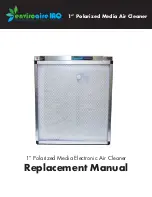
Chapter 7 System Operation And Maintenance 51
Liebert.CRV+ Series Air Cooled Precision Air Conditioner User Manual
7.9.3 Electronic Expansion Valve
The auto-regulation of the electronic expansion valve guarantees sufficient refrigerant for the evaporator in order to
meet the needs of the load. The superheat degree is an indicator of the operation state of electronic expansion valve.
If the refrigerant to the evaporator is insufficient, the superheat degree will be high; and if the refrigerant to the
evaporator is too much, the superheat degree will be low.
Note
The suction superheat degree has vital effect on the compressor lifetime. If the compressor operates under
low or none suction superheat degree for a long time, it may cause slugging of the compressor and break the
scroll pan of the scroll compressor.
It is recommended that the customer should not regulate the electronic expansion valve in site, if necessary,
please contact Emerson technical support engineer.
7.9.4 Air-Cooled Condensor
When the airflow through the outdoor unit is restricted, use compressed air or fin cleaner (alkalescence) to clean the
condenser off the dust and debris that inhibit airflow. The compressed air should be blown at the reversed airflow
direction. In winter, do not let snow to accumulate around the side or underneath the condenser. Check for bent or
damaged fins and simply repair them if necessary. Check all refrigerant pipes for vibration and support them if
necessary. Carefully inspect all refrigerant pipes for signs of oil leakage, determining the leakage position.
7.9.5 Compressor
No direct contact between the refrigerant or lubricant and the skin when replacing the compressor, or serious
burning or frostbite may occur. Put on gloves with long sleeves when processing polluted parts.
The Liebert.CRV+ system uses the DC brushless scroll compressor with high efficiency and high reliability. The
engineering construction must be performed by following correct procedures strictly.
It is rare for the motor of the compressor to get burned due to invalid insulation. In the few cases when the motor
does get burned, the cause is usually mechanical or due to poor lubrication, in other words, due to over-temperature.
If the causes that lead to the compressor failure could be discovered and corrected in time, most failures are
avoidable. The maintenance personnel should check the operation situation periodically and take necessary
measures to ensure the system normal operation. This practice is both easy and cost saving, when you compare it
with replacing the compressor upon faults that result from negligence.
When diagnosing the compressor, check the operation status of all the electric parts of the compressor.
1. Check all the fuses and circuit breakers.
2. Check the operation of HP switch, HP sensor and LP sensors.
3. When the compressor is faulty, find out the nature of the cause: is it an electrical fault or a mechanical fault?
4. Check relevant history alarm information and history operating records.
Mechanical faults
Upon a mechanical fault, there is no burned smell. You should try spinning the motor. If the fault is proved to be
mechanical, the compressor has to be replaced. If the motor is burned, you should remove the fault that leads to the
burning of the motor and clean the system. It must be pointed out that the compressor motor is usually burned
because the system is not cleaned properly.
Electric faults
You can tell an electric fault by the unpleasant smell. If serious burning occurred, the lubricant will appear black and
become acid. When electric fault occurs and the compressor motor is entirely burned, the system must be cleaned to
remove the acid material from the system and to avoid such faults in the future.












































